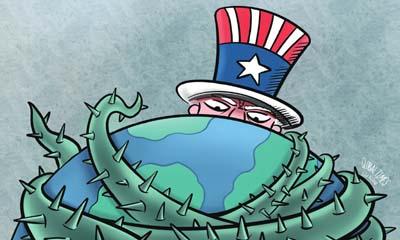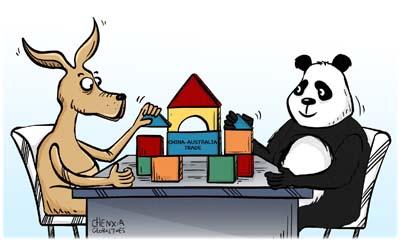
Exploitation is at the heart of American capitalist competition
Ding Gang
Washington’s strategy toward China increasingly employs security and human rights as pretexts to dominate or exclude Chinese firms from the global market, including the US market. This strategy is becoming a clear manifestation of the capitalist mentality of “winner takes all,” which exacerbates the inherent flaws of American Capitalism.
Economist Mordecai Kurz, in his recent article titled “How Capitalism Became a Threat to Democracy,” states very clearly: “Since the 1980s, American capitalism has been transformed into a winner-takes-all economy in which one or a few technologically dominant firms monopolize each sector at the expense of consumers, workers, and overall growth. And with permanent market power comes the kind of political power that is antithetical to democracy.”
While Kurz speaks of the US, this phenomenon is indeed a global issue within the realms of the world economy, finance, and trade.
In recent conflicts involving Chinese companies, I’ve pondered why American corporations have consistently ranked among the top three globally in terms of strength for many years. Why is it increasingly impossible for companies from China and other countries to break into this top tier? Clearly, the “winner-takes-all” principle is at play.

In this era defined by capital, the US seems to have moved away from being a nation driven by ideals and principles to becoming one that is driven by a Wall Street’s chess game, where every move concentrates power and wealth into its Aladdin’s Cave. Wall Street is not just the financial heart of the US but also the brain controlling the country’s lifeline. Its every beat dictates Washington’s policy directions and the future of market competition in the US and across the globe.
The real challenge lies in deciphering the complex codes behind Wall Street that dictate the economic and political trajectory of the nation.
In July 2021, President Joe Biden, while signing an anti-monopoly bill, stated, “Look, I’m a proud capitalist… But let me be very clear: Capitalism without competition isn’t capitalism, it’s exploitation.”
However, reality is not as bright as Biden’s words suggest. The so-called competition includes blatant plundering. One netizen commented that “exploitation is an essential component of capitalist competition.”
Market competition is a core characteristic of the capitalist economy. Yet, this competition does not always occur on equal terms. Historically and in modern times, there have been instances of unequal power dynamics, such as through colonialism or economic hegemony, where stronger nations or companies use their dominant position to influence or control the economic decisions and market access of weaker nations.
The modern version of “colonialism” no longer relies on cannons and warships, but financial instruments and trade agreements remain tools for hegemonic nations to expand and maintain their dominance.
In this process, unequal trade, unfair exploitation of intellectual property rights, and even political interference in developing countries are all part of the strategy for capital expansion. Global economic, trade, and financial orders require reform, and a key aspect of this reform is whether it can allow emerging economies and their companies to grow and compete on equal terms with the American corporate giants. If it can’t, these emerging economies will constantly face the risk of being eaten or forced out of the market.
The writer is a senior editor with People’s Daily, and currently a senior fellow with the Chongyang Institute for Financial Studies at Renmin University of China
